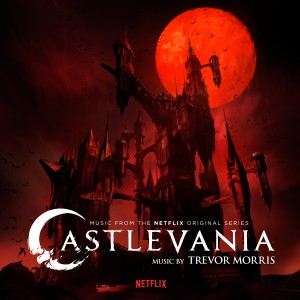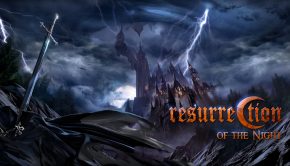Castlevania – Music from the Netflix Original Series
 |
Album Title: Castlevania (Music from the Netflix Original Series) |
| Record Label: Lakeshore Records |
|
| Catalog No.: N/A |
|
| Release Date: July 7, 2017 |
|
| Purchase: Purchase on iTunes |
Overview
Trevor Morris is not a man to pity. A prolific composer and two-time Emmy winner, Morris was chosen to score Castlevania, the much-anticipated adaptation of Castlevania III: Dracula’s Curse. Castlevania comes under the auspices of Frederator Studios (Adventure Time) and comics legend Warren Ellis. Nothing about this arrangement suggests that Morris is due anything but recognition for his skill (except maybe envy).
Yet Castlevania comes freighted with fan expectations, not least where its music is concerned. After all, Konami Kukeiha Club is a tough act to follow. And with Mondo’s recent reissue of Dracula’s Curse, the game’s beloved chiptunes are fresh in fans’ minds. Small wonder, then, that some have rushed to YouTube to condemn Morris’s music. The top comment on one YouTube upload? “Holy shit the music sucked in this show compared to the games.” Over at Retronauts, Jeremy Parish is more articulate but no less critical, describing the soundtrack as “generic ‘epic’ film orchestration” and a “creative misstep.” Other commenters are kinder, but it’s clear from the spate of jibes that some were unhappy to hear original compositions where arrangements were expected.
But why expect arrangements in the first place? Showrunner Adi Shankar could have leaned on Dracula’s Curse, shoehorning its music into every scene whether fit for the purpose or not. Instead, his team commissioned a new and moody score to contrast the animated series with its source material, which revels in lighthearted Hammer horror. The result is a tonally suitable soundtrack, but one that lingers only a little while in the mind.
Body
To express its dark heart, Morris assembled Castlevania from brooding samples and custom synths, producing a soundtrack of anachronism and abstraction. Castlevania may be set in 15th-century Romania but its music is rooted in horror movies of the 1980s. “Wallachia 1455,” for example, is not a Renaissance composition but one centered on synth arpeggio. A similar foundation anchors “Night Hordes Besiege Gresit,” around which thudding drums and shrieking strings accumulate. And “Lisa of Lupu” is dominated by a two-note sequence (A, B, A, A) that provides a gravitational pull for the breathy whispers and blaring brass that would otherwise careen out of control. This template is used throughout the soundtrack, lending it coherence but sameness too.
Some tracks are more distinctive. In “The True Science,” piano notes ring out like ripples of water and fade into stillness. The ambient “Murdenu Tavern” features two brief loops, metallic percussion and murmuring synth, that weave between one another but never connect, like children playing Marco Polo in the dark. And “Tavern Brawl,” a jaunty lute-like number, is one of a few songs that listeners might find themselves whistling.
But such snatches of melody are uncommon. Nothing here is as instantly recognizable as Kukeiha Club’s “Beginning” or “Demon Seed.” Most of Morris’s compositions are loosely-structured soundscapes meant to suggest mood or enhance the drama on screen. These self-effacing tracks — “Vlad Searches for Lisa” and “There Are No Innocents,” for example — eschew the limelight, happy to play a supporting role to Sam Deats’s direction, Warren Ellis’s writing, and the cast’s voiceover. Have I damned such soundscapes with faint praise? No more than their creator, who admits in a 2013 interview that “cultivating your own voice as an artist is incredibly important, and something I am conscious of. But never at the expense of the story, story always comes first.”
When it doesn’t, when the music asserts itself most forcefully, the result draws unflattering comparisons. With its staccato strings, martial drums, and keyboard choir, “Main Title” is music you’ve heard everywhere — and nowhere. It’s the soundtrack to a dozen dimly remembered medieval fantasies. And Castlevania’s fight music is full of Zimmer-esque bombast. “Trevor Fights the Cyclops” is all pounding drums and ubiquitous braaams, as is the climactic “Trevor Fights Alucard.” Yet one’s pulse quickens on hearing such stuff. It makes the stakes seem suitably high. So hasn’t Morris done his job?
Summary
Many of his compositions are workmanlike. And if that word is sometimes used as an insult, remember its first definition: “characterized by the skill and efficiency typical of a good workman.” Such is Trevor Morris. Such is Castlevania.
Do you agree with the review and score? Let us know in the comments below!
3.5
Posted on August 21, 2017 by Michael Hughes. Last modified on August 21, 2017.














